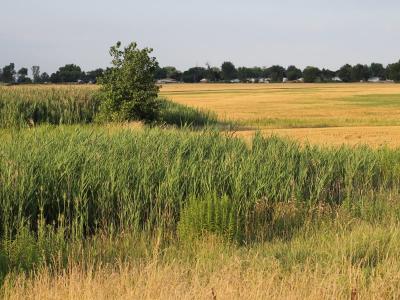
Otter Creek, Wallaceburg: Patterns of past Indigenous land use are layered with 21st century farming, extensive drainage, and invasive species, (phragmites australis background shoreline), courtesy of Rick Fehr.
Research Overview
Our research asks: what innovations in collaborative land use planning are possible to enhance relations among First Nations and municipal planners in the context of land use planning in Southern Ontario?
Collectively, our inter-disciplinary research serves to enhance First Nation-municipal relationships in southern Ontario by meeting six objectives:
- to map and describe land use change on First Nations’ traditional territories.
- to describe and learn from emerging collaborative Indigenous-municipal planning processes.
- to enable archaeological master planning and how such knowledge is integrated into municipal Official Plans.
- to examine the impact of the 2014 Ontario Provincial Policy Statement (PPS) over the course of this project on consultation and accommodation associated with development on First Nation traditional territories.
- to develop evaluation criteria for measuring changes, including progress, to Indigenous-municipal relations in the context of land use planning on traditional First Nation territories in Southern Ontario.
- to determine how the criteria for evaluating Indigenous-municipal relations can be generalized to other jurisdictions in Canada.
Our theoretical approach brings together two emerging bodies of theory: decolonization and critical indigenist approaches to research.
Decolonization
Decolonization is both a theory and a process, as yet unrealised, that actively addresses the structural inequalities of power, opportunity and equity foundational to colonization, promoting both freedom and sovereignty for Indigenous Peoples. As a theory, decolonization is about creating knowledge and enhances understanding across the ways of knowing and natures of being in the world; in this way, it has an aim of enhancing intercultural exchange and understanding. As a process, decolonization is about opening a space for privileging and valuing Indigenous voices, practices, advocacy, and how they interplay with Indigenous activism.
Critical Indigenist Approaches to Research
Our approach to research builds on the term “indigenist” as presented by Shawn Wilson in Research is Ceremony (2008). Critical indigenist approaches to research are anti-oppressive approaches and are critically reflexive because they require self and collective awareness of how knowledge is being created and “purposively give space for political examination of location and privilege” as noted by Margaret Kovach in “Indigenous Methodologies: Characteristics, conversations, and contexts” (2010, p.33). Our theoretical approach provides the foundation to a structured, systematic method for addressing the underlying frames of reference, systemic issues and bureaucratic structures that perpetuate social injustices.
Research Projects
There are three research projects under way and led by PWIP Research Group team members. These projects examine specific planning and policy issues and highlight experiences involving First Nation-municipal relations in the context of land use planning in Southern Ontario.
- Historical Ecology
- Indigenous Planning and the Ontario Greenbelt Plan
- Policy Implementation and Monitoring
Graduate students involved with the PWIP Research Group have expanded on these three research projects and have also explored Indigenous-municipal relations in jurisdictions outside of Southern Ontario.
Teaching and Learning
Experiential learning is a critical outcome of the PWIP Research Group. Two courses have been launched at Queen’s University and at Western University involving PWIP community research partners.